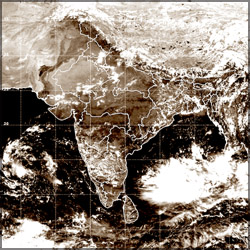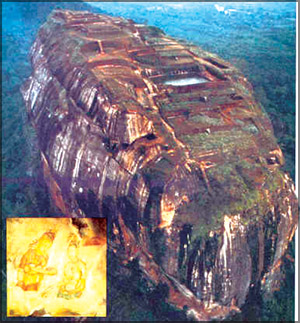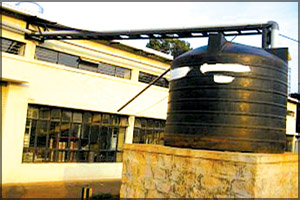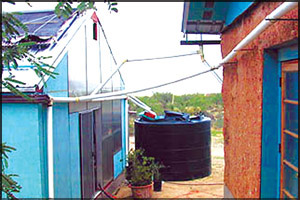|

Meteorological Department upgraded
A new Global Telecommunication System worth Rs. 2 million has been
installed at the Meteorological Department as part of its recent modernisation programme. The system is expected to
accelerate (quicken) the Meteorological Department's disaster warning
system.
as part of its recent modernisation programme. The system is expected to
accelerate (quicken) the Meteorological Department's disaster warning
system.
The new system, received from the US Government, will speed up the
time taken to receive data from the World Meteorological Union Centre in
New Delhi, India.
Earlier, it had taken nearly six hours for the Meteorological
Department to receive the latest data from the New Delhi Centre. With
the installation of this equipment, this time has now been reduced to
one and a half hours.
Climatic data for Sri Lanka is calculated only after scanning a wide
area around Sri Lanka; this area extends to parts of Africa and Asia.
Every country is not capable of scanning such a wide area for
calculating this data.
The World Meteorological Union had set up a centre in New Delhi as a
solution to this problem; so that the climatic data received from each
country in the region could be calculated every three hours.
This data is systematically processed by the New Delhi Centre and
re-transmitted to other countries in the region, enabling them to issue
their forecasts correctly.
Fresh milk for Hambantota students
The benefits of fresh milk are many; it is nutritious, delicious and
healthy. It is extremely good for people, especially children. But, today, the habit of consuming fresh milk is
not very widely prevalent(in existence) as most people have got used to
drinking powdered milk. But now, there are many programmes to promote
the consumption of fresh milk.
especially children. But, today, the habit of consuming fresh milk is
not very widely prevalent(in existence) as most people have got used to
drinking powdered milk. But now, there are many programmes to promote
the consumption of fresh milk.
The programme launched recently in Hambantota by the Development Fund
of the Cooperative Development Department is one such project.
Five schools in the Hambantota district were selected for the initial
stage; each child from these schools will get a glass of fresh milk. The
schools were selected on the basis of the students' low nutrition
levels.
The pilot project was implemented in Hambantota, and based on its
success, it will be spread to the other districts.
Museum for Sigiriya with Japanese assistance
The Japanese government has provided a grant of 170 million Yen (Rs.
153 million) to Sri Lanka towards the new Archaeological Heritage Museum at Sigiriya.
Archaeological Heritage Museum at Sigiriya.
The assistance provided to the World Heritage Site comes under the
Japanese Cultural Grant Aid Programme and will be utilised to supply
essential display equipment for the museum.
The installation of modern presentation and display equipment will
help the dissemination of information to visitors and enhance the unique
archaeological and cultural significance of this Fourth Century
monument.
The museum is currently being constructed, again with the assistance
of the government of Japan, and will be complemented with this new
project. The construction work is expected to be completed by the end of
March next year and is estimated to cost around Rs. 220 million.
Japan has also provided financial assistance to improve the access
roads to Sigiriya; improve the fresco gallery, observation platform and
steel stairway leading to the rock summit; construct visitor
conveniences and safety facilities; and improve the landscaping of the
site.
The new project will be carried out through the Central Cultural Fund
under the supervision of the Ministry of Cultural Affairs in close
collaboration with Japanese consultants.
Making the best of rain water
Have you heard of rain water harvesting? It is a process where the
water that comes down to the earth as rain is collected and used for
various purposes without letting it go waste. This is a procedure that
is used in many countries to make the most of the rain water that would
otherwise be wasted.
This is a process that we in Sri Lanka could also use, considering
the fact that there are many areas in our country without adequate
access to water. Now, the government has introduced amendments to the
Urban Development Authority Act to promote and improve rain water
harvesting techniques in Sri Lanka.
Although most people settle in dry areas due to fast development and
urbanisation of such areas, these areas
|
 
Rain water harvesting techniques |
suffer from water shortages.
Thus, it is essential to improve rain water harvesting techniques to
fulfil their needs. This could be considered as the only option for
people living in the dry zone, coastal areas with hard water and
mountainous areas in the island. Sri Lanka receives an average annual
rainfall of 1,700 mm (this could vary between 900 mm and 6,000 mm
depending on the province).
However, a large portion of this rain water flows to the sea without
being made use of, or being absorbed to the ground as most of the ground
is covered by pavements, tarred roads and buildings, especially in urban
areas.
Only 60 per cent of the rainfall is used, while 40 per cent flows to
the sea. This is around 100 billion cubic metres of water per year. The
average rainfall in the Colombo Metropolitan region is 2,000 mm. If this
rain water is collected, it is estimated that one person can collect 196
litres of water per day.
If rain water is thus harvested at domestic level, using a rooftop
with an area of 100 square metres, 136 cubic metres of water can be
collected. Accordingly, each family can get 372 litres of rain water,
which is half of the daily water requirement of a family with five
members.
Off to Cyprus
The National Drama Institute, which is affiliated to the Children
Skills Development Programme (CSDP), sent a delegation to participate in
the Greek Drama Festival which is being held in Cyprus.
This is the fourth time that this Institute would be taking part in
this event. The delegation comprised Director, CSDP, Rathna Pushpa
Kumari, Mahesh Lakmal and the child actress Nayumi Oshini, who starred
as Antigone in the Greek drama Antigone, which was staged by the
organisation this year.
The next international event the CSDP would be taking part in, is the
children's concert which would be held in Singapore in connection with
the forthcoming Children's Day.
Those interested in taking part can get further information by
writing to the Children Skills Development Programme, No. 51, Sri
Dharmarama Road, Dematagoda, Colombo 9 or calling 011-2672718 or
011-2689536.
|
